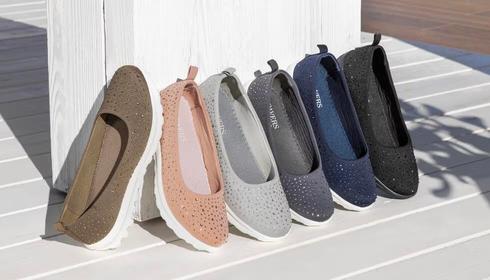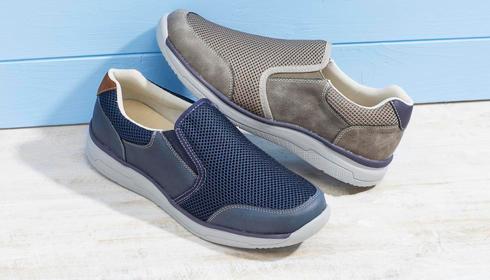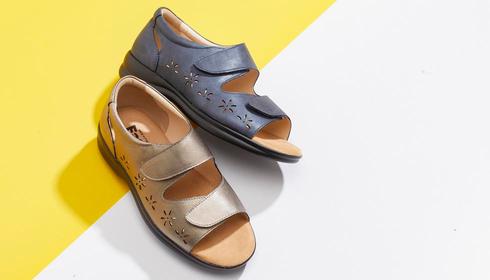
What Are The Best Shoes for Arthritis?
3 March 2023
If you’re living with arthritis, you may be all too aware of the joint pain and swelling that make everyday activities like standing and walking a real challenge. Finding the right shoes for arthritis is important as they can support the joints, tendons, and ligaments in your feet, helping to reduce inflammation.
We believe your feet deserve the very best, so you need the shoes that will keep you looking and feeling great all day long. We spend so much of our time wearing shoes, so it’s vital that they are comfortable and supportive to ensure that your feet are well cared for.
What is Arthritis?
Arthritis is a common condition that causes pain and inflammation in the joints. It's not a single disease but rather a general term encompassing more than 100 different types of joint diseases. Symptoms often include joint pain, swelling, stiffness, and reduced range of motion, which can vary in severity from mild to debilitating.
Arthritis can notably influence the feet, bringing both discomfort and structural changes. It can cause inflammation, stiffness, and pain in any of these, leading to difficulty in movement and daily activities. Common manifestations include swelling of the toe joints or ankle, bunions, or even claw toes, where toes take on a claw-like appearance. The continuous wear and tear can result in altered walking patterns, formation of calluses and increased vulnerability to ulcers, especially if not supported by appropriate footwear.
By understanding the symptoms and seeking early intervention, you can help manage the condition and maintain good foot health. We love chatting about all things shoes, but it’s essential to remember we’re not medical pros. If foot health is a concern, it's always best to have a chat with a medical expert. We also recommend checking out the NHS website for more information.
What Footwear to Avoid?
People with arthritis need to be especially selective about their footwear to ensure optimal comfort and support, and to minimize any aggravation to their joints. Here are some types of footwear those with arthritis might consider avoiding:
- High Heels: Especially those taller than two inches. High heels can increase pressure on the balls of the feet and knees, possibly exacerbating arthritis pain.
- Pointed Shoes: Shoes with a very narrow toe box can cramp the toes, causing additional pain, and may also contribute to other foot problems like bunions or hammertoes.
- Flip-Flops: They usually don't provide any arch support or cushioning, which can be problematic for those with arthritis. Plus, the way feet grip flip-flops can strain the toes.
- Worn-Out Shoes: Shoes that are old, worn-out, or stretched can lack the necessary support and cushioning, which can lead to added stress on joints.
- Shoes with Rigid Soles: These can exacerbate pain by not allowing the natural movement of the foot.
- Shoes without Fastenings: If the shoe doesn’t stay on the foot properly, it can lead to improper gait or foot strain as one tries to keep the shoe in place.
- Barefoot Walking: Especially on hard surfaces, walking without any cushioning or support can strain the joints.
For those with arthritis, it's crucial to prioritize comfort, support, and a proper fit. Consulting with a rheumatologist or a podiatrist can provide tailored advice based on individual needs.
Choosing the Best Shoes for Arthritis

When living with arthritis, finding the right footwear becomes pivotal for comfort and mobility.
At Pavers, we recommend shoes that provide ample cushioning, support, and roomy fits to ease joint strain. Look for styles with adjustable closures, like touch-fasten straps or laces, to accommodate swelling and ensure a snug fit. Always prioritize a sturdy, non-slip sole for stability, and consider orthotic-friendly designs if you're using custom inserts. Remember, your feet deserve that extra tender loving care, especially with arthritis, so invest in comfort and style hand in hand.
Cushioned Insoles
Shoes with cushioning are the best footwear for those with foot arthritis or rheumatoid arthritis. When shopping for your next pair of shoes, look for footwear with cushioned insoles or memory foam footbeds. They will help to soften the impact of your step as you walk, creating a more stable and comfortable base for your feet.
Having arthritis can cause further issues with feet such as corns, bunions, and hammer toes. Memory foam insoles are packed with clever cushioned technology that will mold to fit the exact shape of your feet, giving comfort and support that is personal to you. It is a real bonus if your feet swell or change shape throughout the day.
Arch Support
Arthritis can impact the way our feet feel and function, therefore making the right shoe choice vital. Arch support shoes create a foundation that cradles the foot, distributes weight evenly, and alleviates undue stress on joints. This can mean reduced pain, better mobility, and a comforting embrace for every step.

Wide Fit
Research shows that people in the UK are twice as likely to buy shoes that are too small. Footwear that is too tight can pinch and rub and worsen the symptoms of arthritis, leading to very unhappy feet.
However, finding your shoe size is just one factor to consider in your quest to find the perfect fitting pair, as it’s important to understand your foot width too. We recommend getting your feet measured to determine your shoe size and width, it will help make shopping for your new dream pair even easier.
Wearing shoes with the correct width is particularly important for those with arthritis. Shoes and trainers with wider toe boxes are the best for big-toe arthritis, whereas footwear with stretch-fit designs are ideal for those who suffer from painful and swollen joints.
Removable Insoles
Customization is key for comfort, especially for those with specific foot needs. Removable insoles allow arthritis sufferers to swap out the default padding for orthopedic or custom-made inserts. This flexibility ensures a tailored footbed that provides optimal support and cushioning.
A podiatrist will recommend the most suitable insoles for your condition, such as inlays with additional padding or arch support. Custom orthotics can also be made and adapted as your condition develops.
Removable insoles can be the most cost-effective way to adapt your favourite footwear into an arthritis-friendly pair. Plus, some insoles are even washing machine-friendly, so you can keep them fresher for longer.
Adjustable Fastenings
The more adjustability a shoe has, the easier it is to fit. This is an important feature to consider if you need to accommodate changes in your foot size or shape, especially during an arthritis flare-up.
Arthritis can cause foot shapes to change over time due to swelling or other conditions. Adjustable fastenings, like touch-fastenings or laces, offer flexibility in fit. They ensure that the shoe can be adapted to provide a snug but comfortable hold, accommodating the foot's unique shape and reducing potential pressure points.
Low and Stable Heels
Balance can sometimes be a challenge with joint issues. Low and stable heels provide a sturdy foundation, reducing the risk of strains or sprains. They also align the foot and ankle naturally, avoiding excessive pressure on the joints and ensuring a confident walk. Steer clear of high heels which can exacerbate joint pain.
Easy Slip-On Designs
For those with arthritis, manipulating shoes can sometimes be a painful or cumbersome task. Easy slip-on designs remove the need for excessive bending or tugging, making the process of wearing and removing shoes a breeze. It's not just about style; it's about promoting independence and reducing discomfort.
Shock-Absorbing Shoes
Walking can sometimes send jarring shocks up the leg, which can be painful for arthritis sufferers. Shock-absorbing soles help to diminish and absorb this impact. By dispersing the force throughout the sole, these shoes can significantly reduce joint and muscle strain and stress, allowing for a smoother, pain-free stride.
Don’t Suffer with Your Foot Health
We have several handy blogs with plenty of information on coping with a range of different foot problems. Check them out below.

